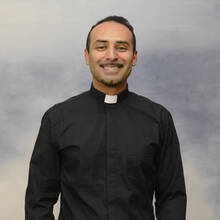How the loved ones we’ve lost have helped prepare the way of our lives
Anyone who attends funerals often knows how storytelling reveals the life of the deceased. The stories of everyday life that mourners share frequently provide more insight into the deceased’s character than any listing of life accomplishments or honors. These stories convey little nuances that only close friends and family may have recognized. The members of the Johannine community were the “friends and family” who preserved these nuanced stories of Jesus’ life. Some of them may have known Jesus during his ministry and all of them were sensitive to his resurrected presence. In this Sunday’s Gospel passage, the community remembers a time when they still had much to discover about their Lord and savior.
In my Father’s house there are many dwelling places. If there were not, would I have told you that I am going to prepare a place for you? (Jn 14:2)
What “Way” is your life following today?
When loved ones die, what questions have you brought to the risen Christ?
How have you responded to the cost of discipleship? How can you respond today?
This passage marks the beginning of Jesus’ first Farewell Discourse (Jn 14:1-31). It is used frequently at funeral liturgies because of its manifest concern for the afterlife. As this chapter begins, the last supper and the washing of the feet have already concluded, and Jesus has just shared his ultimate mandate to love one another (Jn 13:31-35). In these final moments together, Peter, Thomas and Philip feel the boldness to ask specific questions of Jesus.
Thomas raises an initial question in this Sunday’s Gospel, “Master, we do not know where you are going; how can we know the way?” (Jn 14:5). Jesus’ response is all encompassing, “I am the way and the truth and the life. No one comes to the Father except through me” (Jn 14:6). The “way” in John’s Gospel is to believe in Jesus and to follow his example and teaching, but the full meaning is tied to two questions from Peter that immediately precede this Sunday’s Gospel passage. “Master, where are you going? Master, why can’t I follow you now?” (Jn 13:36-38). As the narrative unfolds, it is clear that Peter is not ready, but all these questions from Peter and Thomas provide a broader scope for the meaning of discipleship. It includes martyrdom, the total sacrifice of one’s life, either through death or through a life of discipleship.
Today’s Sunday passage is a personal favorite of mine to use for funeral liturgies. Our loved ones, too, leave us and help prepare the way.
Philip also makes a request. “Master, show us the Father, and that will be enough for us” (Jn 14:8). This request allows Jesus to remind Philip that by knowing him Philip knows the Father. “How,” asks Jesus, “can you say, ‘Show us the Father?’” (Jn 14:9). If Philip continues to doubt Jesus’ answer, he needs only to look at the works of Jesus, “Whoever believes in me will do the works that I do, and will do greater ones than these, because I am going to the Father (Jn 14:12). All the work needed for salvation is complete in the sacrifice of Christ. The continuing “work” of Jesus’ disciples simply magnifies the great work of his glorification on the cross. In this Johannine theme, it is necessary to place one’s conviction in the fact that Jesus goes to the Father to prepare the way. “I go and prepare a place for you,” says Jesus to Thomas, “so that where I am you also may be” (Jn 14:3).
Today’s Sunday passage is a personal favorite of mine to use for funeral liturgies. Our loved ones, too, leave us and help prepare the way. In this reflection, one can hear an echo of the Johannine community asking the question, “Where is our life going?” and reflecting on the response of the risen Christ, “Where I am, you also will be, for where I am going, you know the way.








